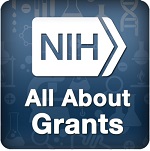☰ ATSU Navigation
RePORTER’s main search page now offers a new map visualization tool that presents active NIH projects by state.
You can filter results by Congressional district, fiscal year, administering NIH Institute/Center, principal investigator, and awardee organization. For example, let's use the tool to explore current NIH funding in Phoenix, AZ.
49 NIH-funded projects
$40,094,412 total funding

Explore the tool yourself here.
With MyRePORTER, create saved searches and set customized weekly email alerts notifying you when new projects are funded or new publications are linked to projects in your search.

Watch this tutorial to learn more!
Watch this 44-minute mock study session to learn how NIH reviewers score applications, what questions they commonly ask, and what mistakes to avoid in your application.

NIH revisited its Inclusion Across the Lifespan Policy (link), now 2 years old, in a recent workshop. Dr. Michael Lauer, NIH Deputy Director for Extramural Research, shared his key takeaways for investigators of clinical trials:
The pandemic presents a compelling case study of the importance of inclusion in clinical studies. Persistent challenges to inclusion of persons across all ages remain, indicated by the young median age (33 - 43 years) of participants in COVID vaccine trials. NIH pledges to continue engaging stakeholders to address inclusion barriers in its supported clinical research.
To learn more, check out the September 2020 videocast and report.

Considerations for a Research Plan
In this episode, NIH program officers Drs. Lillian Kuo, National Cancer Institute, and Kentner Singleton, National Institute of Allergy and Infectious Diseases, share their advice and experience on developing a research plan for a grant application. They discuss the relationship between the specific aims and research strategy, provide suggestions for when you sit down to start writing, and share common pitfalls (transcript available here).
Human Subjects Research Post-Award
Listen to this 7-minute All About Grants podcast episode to learn tips about important post-award requirements, what’s needed for annual progress reporting, engaging your IRB and NIH when a protocol change is needed, the difference between adverse events and unanticipated problems, and much more (transcript available here).
This is the third and final episode of NIH's human subjects research podcast mini-series:
Episode 1: Am I Doing Human Subjects Research? (transcript)
Episode 2: Human Subjects Protection and Monitoring Plans (transcript)
